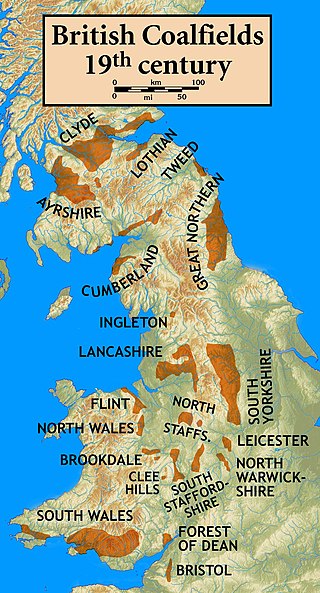
The Transport Act 1962 is an Act of the Parliament of the United Kingdom. Described as the "most momentous piece of legislation in the field of railway law to have been enacted since the Railway and Canal Traffic Act 1854", it was passed by Harold Macmillan's Conservative government to dissolve the British Transport Commission (BTC), which had been established by Clement Attlee's Labour government in 1947 to oversee railways, canals and road freight transport. The Act established the British Railways Board, which took over the BTC's railway responsibilities from 1 January 1963 until the passing of the Railways Act 1993.

The National Coal Board (NCB) was the statutory corporation created to run the nationalised coal mining industry in the United Kingdom. Set up under the Coal Industry Nationalisation Act 1946, it took over the United Kingdom's collieries on "vesting day", 1 January 1947. In 1987, the NCB was renamed the British Coal Corporation, and its assets were subsequently privatised.

The British Coal Corporation was a nationalised corporation responsible for the mining of coal in the United Kingdom from 1987 until it was effectively dissolved in 1997. The corporation was created by renaming its predecessor, the National Coal Board (NCB).

Clement Attlee was invited by King George VI to form the Attlee ministry in the United Kingdom in July 1945, succeeding Winston Churchill as Prime Minister of the United Kingdom. The Labour Party had won a landslide victory at the 1945 general election, and went on to enact policies of what became known as the post-war consensus, including the establishment of the welfare state and the nationalisation of some industries. The government's spell in office was marked by post-war austerity measures, the violent crushing of pro-independence and communist movements in Malaya, the grant of independence to India, the engagement in the Cold War against Soviet Communism as well as the creation of the country's National Health Service (NHS).
The Miners' Federation of Great Britain (MFGB) was established after a meeting of local mining trade unions in Newport, Wales in 1888. The federation was formed to represent and co-ordinate the affairs of local and regional miners' unions in England, Scotland and Wales whose associations remained largely autonomous. At its peak, the federation represented nearly one million workers. It was reorganised into the National Union of Mineworkers in 1945.

The Electricity Act 1947 was an Act of the Parliament of the United Kingdom which nationalised, or bought into state control, the electricity supply industry in Great Britain. It established a central authority called the British Electricity Authority (BEA) to own and operate all public electricity generation and transmission facilities and created 14 area electricity boards with a duty to acquire bulk supplies of electricity from the central authority and to distribute and sell electricity economically and efficiently to industrial, commercial and domestic consumers. It vested 505 separate local authority and company owned electricity undertakings in the BEA with effect from 1 April 1948. The Electricity Act 1947 is one of a number of Acts promulgated by the post-war Labour government to nationalise elements of the UK’s industrial infrastructure; other Acts include the Coal Industry Nationalisation Act 1946; Transport Act 1947 ; Gas Act 1948; and Iron and Steel Act 1949.

The Heritable Jurisdictions (Scotland) Act 1746 was an Act of Parliament passed in the aftermath of the Jacobite rising of 1745 abolishing judicial rights held by Scots heritors. These were a significant source of power, especially for clan chiefs since it gave them a large measure of control over their tenants.

The Coal Act 1938 was an Act of the Parliament of the United Kingdom that created the Coal Commission. Criticized for its inconsistencies, the Act was repealed, by degrees, over the next several decades.
The United Kingdom Mines and quarries regulation in 1910 was a specialised topic in UK labour law, given the complexity of the legislation and seriousness of injuries that people suffered.

Coal mining in the United Kingdom dates back to Roman times and occurred in many different parts of the country. Britain's coalfields are associated with Northumberland and Durham, North and South Wales, Yorkshire, the Scottish Central Belt, Lancashire, Cumbria, the East and West Midlands and Kent. After 1972, coal mining quickly collapsed and had practically disappeared by the 21st century. The consumption of coal—mostly for electricity—fell from 157 million tonnes in 1970 to 18 million tonnes in 2016, of which 77% was imported from Colombia, Russia, and the United States. Employment in coal mines fell from a peak of 1,191,000 in 1920 to 695,000 in 1956, 247,000 in 1976, 44,000 in 1993, and to 2,000 in 2015.

The Electricity Act 1989 provided for the privatisation of the electricity supply industry in Great Britain, by replacing the Central Electricity Generating Board in England and Wales and by restructuring the South of Scotland Electricity Board and the North of Scotland Hydro-Electric Board. The Act also established a licensing regime and a regulator for the industry called the Office of Electricity Regulation (OFFER), which has since become the Office of Gas and Electricity Markets (OFGEM).

The Gas Act 1948 was an Act of the Parliament of the United Kingdom which nationalised, or bought into state control, the gas making and supply industry in Great Britain. It established 12 area gas boards to own and operate all public gas-making, distribution and sales facilities and created a central authority: the Gas Council. It vested the existing local authority and company-owned gas undertakings into the area boards with effect from 1 May 1949. The Gas Act 1948 was one of a number of Acts promulgated by the post-war Labour government to nationalise elements of the UK's industrial infrastructure; other Acts include the Coal Industry Nationalisation Act 1946; the Electricity Act 1947; Transport Act 1947 ; and the Iron and Steel Act 1949.
The Electric Lighting Acts 1882 to 1909 are acts of the Parliament of the United Kingdom.

The Iron and Steel Act 1949 was an Act of the Parliament of the United Kingdom which nationalised, or bought into state control, elements of the iron and steel industry in Great Britain. It established an Iron and Steel Corporation which acquired certain iron and steel companies. In a departure from earlier nationalisations the Corporation only acquired the share capital of the companies, not the undertakings themselves. The individual companies continued to operate under management Boards appointed by the corporation. The Iron and Steel Act 1949 was one of a number of Acts promulgated by the post-war Labour government to nationalise elements of the UK's industrial infrastructure; other Acts include the Coal Industry Nationalisation Act 1946; the Electricity Act 1947; Transport Act 1947 ; and the Gas Act 1948.

The Oil and Gas (Enterprise) Act 1982 is an Act of the Parliament of the United Kingdom which started the process of privatisation of the oil and gas industries in the UK. It empowered the government to float off and sell shares in Britoil the upstream production side of the British National Oil Corporation. It ended the British Gas Corporation’s monopoly on the transportation and supply of gas, opening up the gas market to other gas suppliers. The Act made miscellaneous provisions relating to the oil and gas industries concerning Petroleum Licences and Offshore Installations.

The Petroleum and Submarine Pipe-lines Act 1975 was an act of the Parliament of the United Kingdom which addressed the licensing, ownership, exploitation, production, transportation, processing and refining of petroleum and petroleum products in the UK. Enacted in 1975 when the UK’s first North Sea oil was produced, the act aimed to provide greater public control of the oil industry. The act established the British National Oil Corporation and a National Oil Account; modified the conditions of petroleum licences; controlled the construction and use of underground pipelines; and controlled the development of oil refineries.

The Oil and Pipelines Act 1985 is an Act of the Parliament of the United Kingdom which established the Oil and Pipelines Agency to buy, sell or deal in petroleum and to manage on behalf of the Crown petroleum pipelines and storage installations. The act abolished the British National Oil Corporation and transferred its assets to the Agency.

The Gas Act 1965 is an Act of the Parliament of the United Kingdom which extended the powers of the Gas Council to buy, make or supply gas; it authorised and controlled the underground storage of gas; and permitted the sale of industrial gas for non-fuel purposes. The Act was in response to changing technologies that had developed since the gas industry was nationalised in 1949.

The Electricity and Gas Act 1963 is an act of the Parliament of the United Kingdom which increased the amounts that could be borrowed by the Electricity Council, the electricity boards, the Gas Council, and the area gas boards. It enabled monetary advances to be made to these bodies, and provided for members of the bodies to be recompensed.

The Petroleum (Production) Act 1964 is an Act of the Parliament of Northern Ireland which vested in the Northern Ireland Ministry of Commerce the property in undeveloped petroleum. It also made provision for searching for and producing petroleum.








